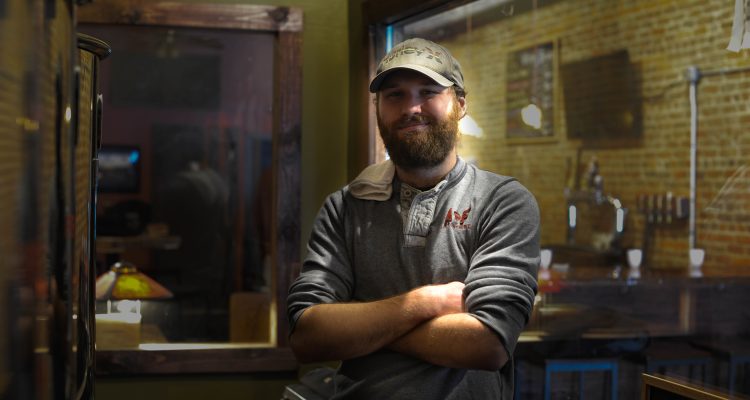By Steve Novotney
Weelunk.com
(Editor’s Note: To listen to Steve’s entire interview with Josh, click on the podcast link at the bottom of the page.)
It’s a product of saccharification, the process of breaking a complex carbohydrate into its monosaccharide components.
And we call it beer, and there is good beer, and there is bad beer.
Millions of Americans attempt to brew their own, and the popularity of craft beers is at its highest right now in the United States with more than 3,000 craft breweries currently in business. In fact, according to an NPR report this past week, crafters are experiencing copyright-law issues concerning the names for new brews because of the massive influx in registrations during the past five years.
Craft brewing was introduced to Wheeling residents, however, nearly 20 years ago with the opening of Nail City Brewing within the Artisan Center on the corner of 14th and Main streets in downtown Wheeling. The business brewed seven lagers and ales, was connected to the legendary Wynkoop Brewing in Denver, and also featured full lunch and dinner menus.
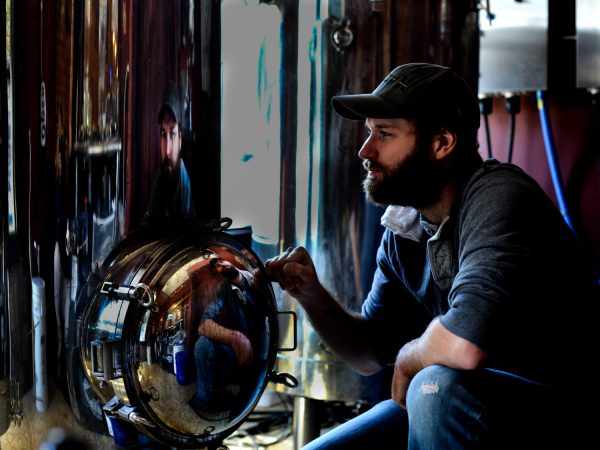
And it flopped. Too often patrons would finish their seven-dollar taster tray and quickly return to the commercial offerings, and that is why a different outfit, River City Restaurant and Catering, has been operating for a decade in the space, and the former brew room is now a limited video lottery parlor.
Craft beer, though, has made its comeback in the Friendly City with the opening of the Wheeling Brewing Company on Market Street in Centre Market. Chad Hill is the CEO, Dave Cornet serves as the CFO, the chief design officer is James Schulte, and Josh Clarke is the operations officer and brewmaster.
And it’s not just about the beer, either. Along with five house brews (Nail City Porter, McColloch’s Wheat, Moon Dog IPA, Panhandle Ale, and Old Reymann’s Ale), Wheeling Brewing offers daily special menu items, such as meatball hoagies, Reubens, Chicken Pot Pastry, Apple Cheddar Sliders, and beer fondue.
“That’s Angie’s department,” said Hill about his wife. “And I know the menu will depend on what our local stores can provide us, and the recipe for the meatball hoagies is from her family – the Zambito family – and it’s what used to be served at the Bella Via Restaurant.
“We all have roles that we fill, and we’re all very hands on,” he said. “For me and Angie, it’s been very hectic because of having full-time jobs, the business, and also our son, (Gabriel John – 5 months old) but this is one of our dreams and we’re working hard to make it come true.”
Hill founded a company known as “Basement Brewing” more than two years ago, it operated in the basement of the Hill home in North Wheeling.
But he knew something was missing.
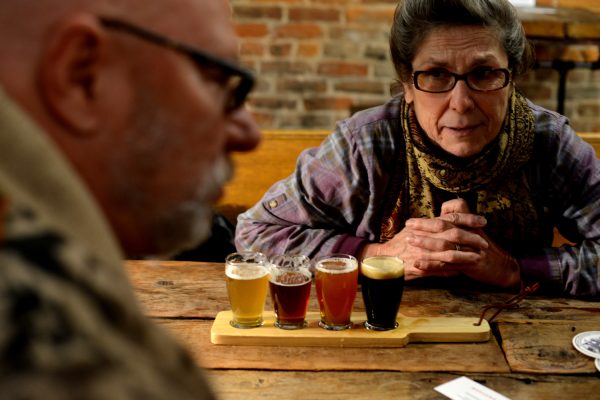
“We were at the point where we had 10 months left on our license and we had to make a decision,” Hill explained. “There were some issues, so it was either go forward or not. That’s when I had a conversation about it with Josh’s father, one of the most interesting people I have ever met in my life.
“He told me about Josh and his history with Magic Hat in Vermont. He said I should contact him, and we got together pretty quick,” he said. “We brewed some beer, and we had a couple of glasses of the beers he had already been working on. It was pretty much the interview process.”
And that first sip?
“It was damn good,” Hill said. “I knew. And we found Josh at the perfect time. This all started as an experiment, and there’s been a lot of hair pulling, but now our dream is coming true. Not only are we open, and doing well, but we’re also concentrating on making partnerships with as many local businesses as we can.
“Of course, we want to do well, make money, and expand in the future. We already have those plans in the works,” he added. “But this is also about being an advertisement of sorts for Wheeling. We want what we are doing to show that Wheeling is back on the rise, and that this time people can believe it to be true.
“That’s the goal, and since Josh joined us, it’s been all uphill.”
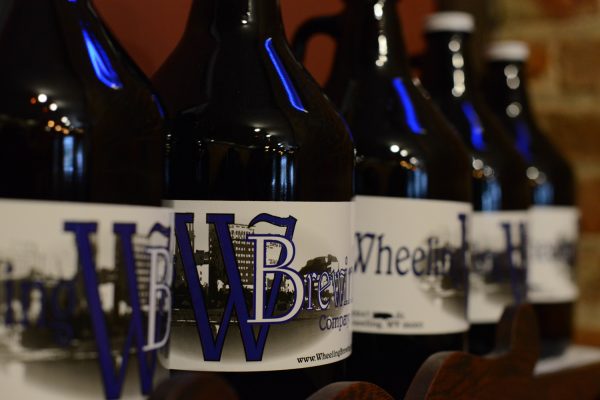
Novotney: Tell me about the process throughout the week.
Clarke: Throughout the week I kind of get free rein to kind of do what I want. I mean handle the entire brewing operation from front-of-the-house to taps. It’s pretty demanding on time.
So generally, at least twice a week, with how much we are moving right now, I have to brew at least two days. Each day that I brew it’s for one person doing all of it, it’s about an eight-hour process. So I can take two days and do that, and then the other two days if I don’t have anything else like transferring beer over to the taps, or cleaning kegs, or any of the millions of activities I could be doing, I work the bar to talk to patrons. It’s a good time to talk to people that are enjoying the product to enhance their experience.
Novotney: Let’s talk about the products Wheeling Brewery now offers. It’s all home brew, of course, and it’s all products of your creation at this time, right?
Clarke: It is. The five house beers – those are ones that I have been developing for years. That is how I started brewing – home brewing – so those have been developed over a long period of time. We have our McColloch’s Wheat, probably our lightest offering, and then we have our Amber Ale, the Moondog IPA, and we also have the Pale Ale, and the Nail City Porter.
Already, not even being open that long, we’ve won a couple of awards for some of them, so I feel pretty confident about how far they’ve come.
Novotney: When you do have the chance to tend the bar and talk to the patrons and hear what they are thinking about your beers, what do you hear the most? Obviously people, to your face, are going to tell you a whole lot of positive things, but if you are like any other creator that I know, you’re looking for constructive criticism because you want your product to become better and better and better.
Clarke: Oh, absolutely. I mean, everyone who knows me in a professional capacity knows that I am my absolute worst critic. I always take a million looks and a million tastes which might cost a bit, but I always keep looking for anything that I can improve on the beer. I don’t think you can ever make a perfect beer. I think it can only get better.
But you were saying what’s the best compliment you can get. I do love people being honest. Those are huge compliments. I think the biggest compliment you can get as a brewer is when you see someone order a pint, and you’re there watching them and they are enjoying it. And you see the glass empty, and they’re just like, “I’ll have another of the same.” So you know they’re not just having one, trying it and they’re done with it, but that they are coming back for more.”
Novotney: Here we are sitting in the middle of your dream come true? Is that correct? Is this something that, the first time you ever thought about doing a home brew in a basement … is this the dream come true?
Clarke: I think for every home brewer it is the dream come true. I mean, you realize more as time goes on, you begin to look at it more as a business, but I mean at the heart of it still 100 percent my passion. I couldn’t imagine doing anything else. Even if you’re in here for hours and hours, and it’s kind of back-breaking – literally, I am carrying grain bags because, mostly, we have a manual brewing system. Everything is handmade.
For me, it’s a creative outlet. Not only do I get to make something myself, and experiment, and do really cool things, and create products that I enjoy, but I get to share it with everyone else which is probably the coolest thing about it.
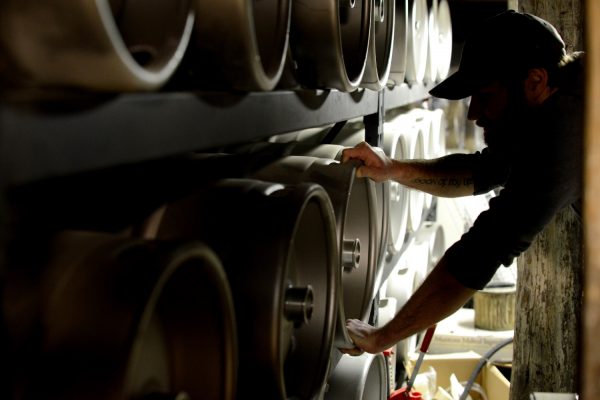
Novotney: Let’s talk about the very first day you decided to brew beer. How did you arrive to that decision in the first place?
Clarke: OK, so this is a fun story.
The very first batch of beer I did was with a friend in high school. We had randomly bought a kit when we were 18 offline, and that was probably the most God-awful batch of beer you could ever imagine. I can’t even believe we drank that. It was just an alcohol delivery system.
But then years passed, and I kind of forgot about it, and then I went to college in Vermont. I got into a forced-triple dormitory, and we were young, and we all had fake IDs, and it was freshman weekend. We were all going to go out and get beer, but all three of us, on the same day, all got our IDs taken away. So there was none of that happening, but …
There was a home brew store right next to our dormitory, so that was our bright idea to go over there and look around and talk to them. We said, “Is it OK that we buy this home brew equipment?” They said that it was just the ingredients. What you do with it is your problem.
So we did that, and we started brewing in our dorm room closet in college, and that went for two years, and then we lived off campus. But became such good friends that we stayed together all four years of college, and we continually kept brewing. We just loved it so much.
They went on to different careers, but I found, besides for my college career, that this is what I truly had a passion for, so I kept pursuing it further than what my degree was.
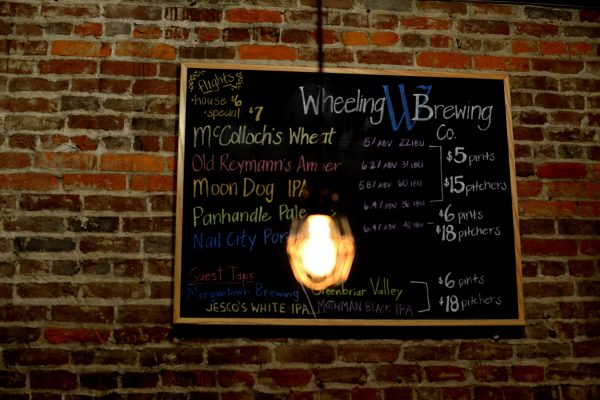
Novotney: What college did you attend and what was your major?
Clarke: I attended the University of Vermont, and I was a dual-English-and-Theatre major.
Novotney: Tell me where you are from. Tell me where your roots are.
Clarke: Originally, I grew up in Canaan Valley, the ski resort town. That was until I was about 9 or 10, and then my family moved up to Fairmont, where my mom’s family is. My dad got a new job up there, so we stayed there through my high school years. And then, after that, I stayed in Vermont for college, and I stayed there for a year or two after college because I loved living up there.
And then I came back to West Virginia to actually save up for a wedding. I’ve been here ever since.
It was kind of awesome to be in that kind of craft beer mecca of the north, but then you come back here, and …
I was a kid in a candy store up there, but there is nothing down here. I was thinking, “West Virginia is so awesome. Why can’t we be this cool?” I want to bring good craft beer to this state.
Novotney: So tell me Josh, how did you connect with everyone else connected to Wheeling Brewing?
Clarke: I get asked this a lot.
My dad works in the ER at Wheeling Hospital, and one of the people he works with is Chad Hill, our CEO. At that time they had Basement Brewery going on, and it was Chad, Jimmy, and Dave. And they were doing all of the brewing.
Chad knew that my dad was a craft beer fan, so he would pass him beers to try, and my dad would give them feedback. Chad was having some issues with the brewery, so my dad told him, “Hey, my son brews, and he’s trying to start his own brewery. Maybe you should talk to him.”
That day I got this text from my dad – “Call this guy, Chad” – and I called him, and we started talking, and then it was just a few weeks later when I came up here to Wheeling, and I brought a bunch of my beers that I had made at home, and I had them try them.
It was really like the next week when he called and said, “We want you. We want you to be the full-time head brewer for Basement.”
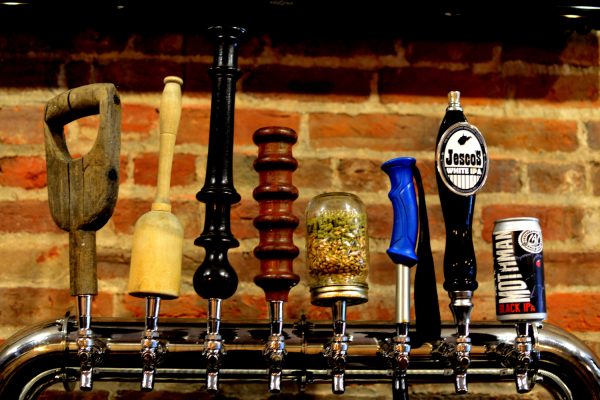
Novotney: So then you started brewing in a basement, but you had brewed in a closet and in basements before so that was kind of a normal operation.
Clarke: I’m used to tight space. I didn’t go to school for brewing or anything like that, and I think most professional brewers that had gone to an institute or some college for it would laugh at some of the methods that I have.
I have learned enough, and through so many years of brewing mistakes and learning from them, I feel like now that I know the rules, I can break them very easily. That makes me a very fluid brewer. I can adapt to situations that probably someone that learned in a classroom couldn’t.
Novotney: And then all of a sudden your partners found this facility. It was announced. You guys started showing up in public and offering samples, and then you had everyone asking and asking and asking, “When are you opening?”
And then it got pushed back. That had to be frustrating for everyone involved.
Clarke: Oh my God, for so many reasons. The hard thing is you want to be open. You want to have people in here trying this sort of stuff. There’s just so much work to do. When we decided to go to a brewpub, and doing the company name change, and everything like that. There’s much with building out the space, and there are the months of getting the licensing done, and getting the loan finalized. And then when you have the loan and all of the money, then it’s like, as soon as you can, hit the ground running.
But, I will say, even though it was frustrating not being able to tell people that we were opening that soon, or we kept pushing it back, it was just so awesome to know that people kept asking and were still very interested in what we were doing. That made me feel good.
Novotney: Are you in development of some new brews?
Clarke: All the time. Constantly. That’s what I think is my favorite thing about craft brewing. I can be so creative with it. I’m coming up with new stuff all of the time. The only thing I am bounded by is how much we can afford to get and how often I can do it.
Besides our five house beers, I’m going to have a seasonal on tap. It’s already in the fermenter right now, so that will be in kegs next week. And we’re always going to have a small batch on tap which is going to be like my little tinkering around. That’s where I get to play around.
Novotney: So seasonals? Are we talking about some kind of new brew each and every one of the four seasons a year?
Clarke: At least one of the seasons, but probably more often than that. I would say two per season. That’s what I am going to set myself at right now. Like I said, if I had the chance to do more, I definitely would. It just depends on tap space.
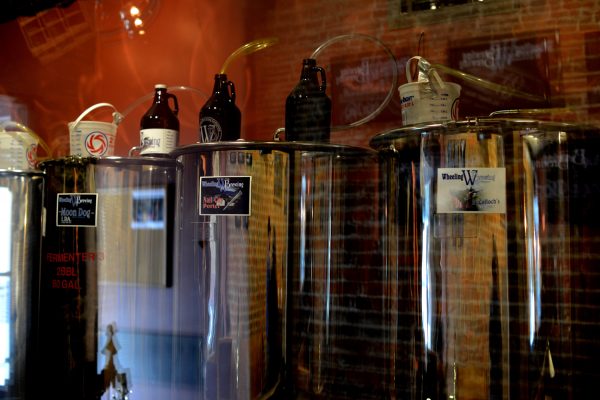
Novotney: The products – the ingredients – you use … where do those come from?
Clarke: The grains … right now we have a contract with a company called Prius, so we get all of our grains through them – all our malts, and everything. We do have a contract we’re working out with Hop Union for all of our hops. We’re actually, right now, using some hops from local farmers. We’re just kind of working with them because they are going to be growing for us. So we’re just trying to let them know and figuring it out with the recipes and the schedule so we know how much we are going to need.
That’s really exciting. At one point, we want to have almost all of the brews using exclusively West Virginia-grown hops.
Novotney: I have been told West Virginia has the perfect climate for growing hops. Is that true, Josh?
Clarke: It is. I am actually a part of a project by the West Virginia University. Their extension program. They are actually trying right now to see the potential of West Virginia as having hops as a cash-crop industry. I have been giving them data this past year. They have given me 15 hop rhizomes, which are the roots they grow from. I’ve got a big trellis in my back yard, so I have been checking that out, and I can tell you, from personal experience that those things grow like a weed.
Novotney: Not a lot of people brew their own beer. You tell me – what is Step One when you’re creating a new brew?
Clarke: The first step is really recipe creation. One of the best things is just going to the basics and looking at the style. There’s a huge thing called the Beer Judging Certification Program, and they have outlines of every beer style. So you look at that. You see what the style is asking for if you’re going to brew the style, and then you go look at commercial examples. You taste them. You see what you like and what you don’t like. Then you can see what recipes are similar to those, and then, like painter, you can pick and choose the color, and then craft it how you want it to be.
That’s something that only comes with years of experience with using those malts. But eventually you get to the point where, “OK, I can see if I add a little bit of this, a little bit of this, it will do this in the finished beer. Believe me, there are a lot of mistakes to get to that point of knowledge.
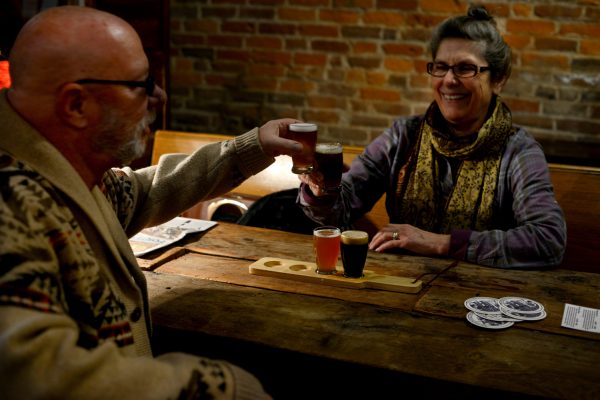
Novotney: When you went after creating the Moondog IPA, what was on your mind? What did you know you had to do with that beer as opposed to other beers because Charles was involved?
Clarke: That beer … that one is one that is closest to my heart. I love a really good IPA, and I wanted that to be classic IPA with a lot of flavor, but not too much malt or body that you couldn’t have a few while you’re sitting down.
That one, I mean, I really just went back to the basics and I just fine-tuned it for a long time. I wanted it to be – if I had to pick one adjective – solid. I wanted it to be a very solid beer, and I think it is. Out of the first run of our five beers it was the first one that sold out, so I think I succeeded on that front, at least.
Novotney: Craft beer attempted to make the Wheeling scene in the late 1990s with the opening of Nail City. It was connected to the Wynkoop Brewery out of Denver. Pretty legendary, but it didn’t work in Wheeling, W.Va. Why is it working now?
Clarke: I know one of the guys that were involved with that. His name is Eric Watson. I talked to him about that, and it wasn’t the time. Craft brewing has hit its stride now. This is the first year since prohibition that craft brewers have met the same amount of output as the large-scale brewers like Budweiser, Miller, and Coors. So we are actually right there with them.
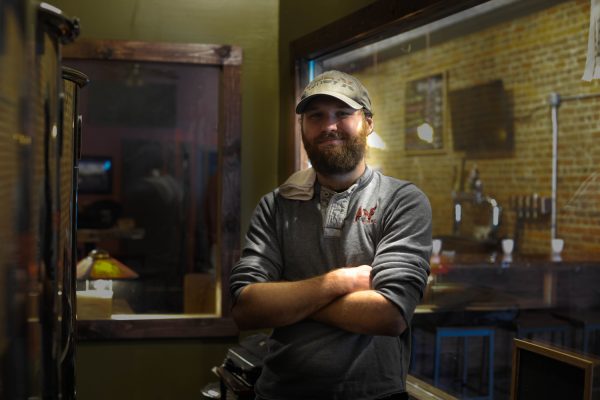
Some people thought it wouldn’t happen for 20 or 30 years, but we’re there now. We have kind of poked the tiger, if you will.
There’s not only that, but there’s this push for local businesses, and everyone has been super supportive. I don’t think there was enough of that knowledge base either. People didn’t have an appreciation for craft beer then like they do now. Now that it’s boomed.
It’s worked out so well because we’ve struck while the iron is hot. We’re just extremely lucky. I’m thankful for that.


